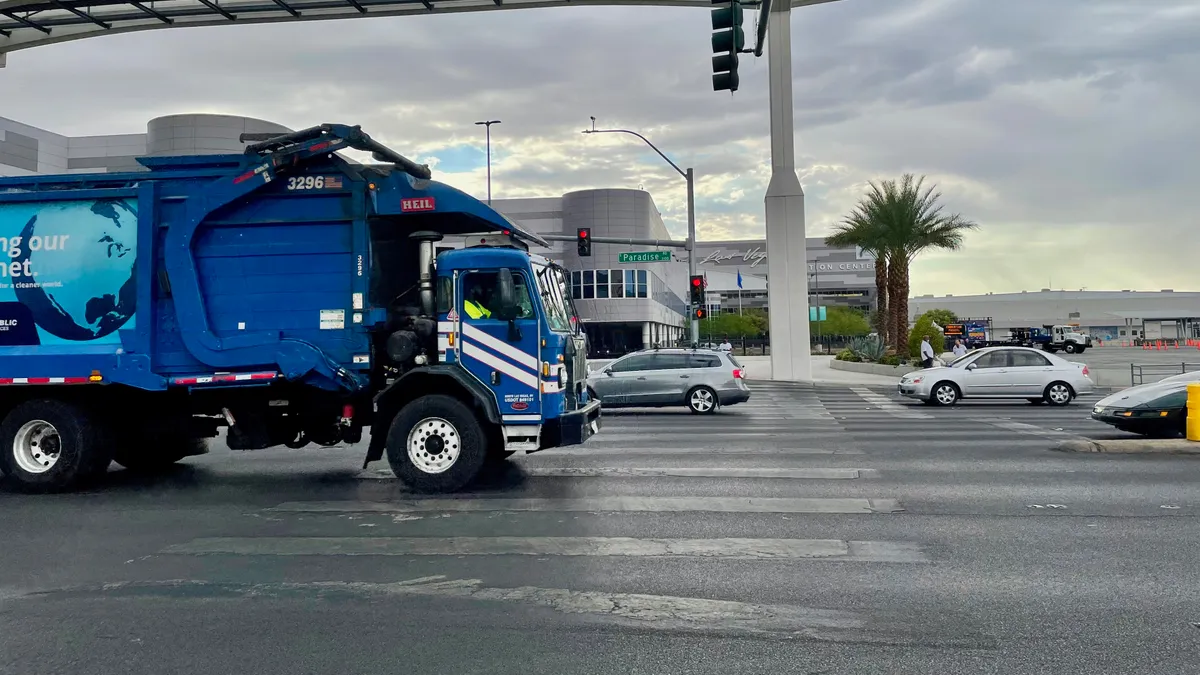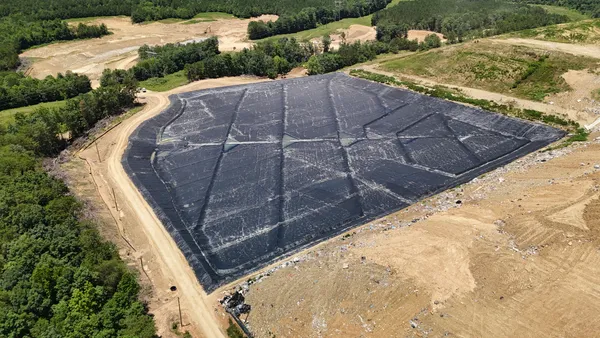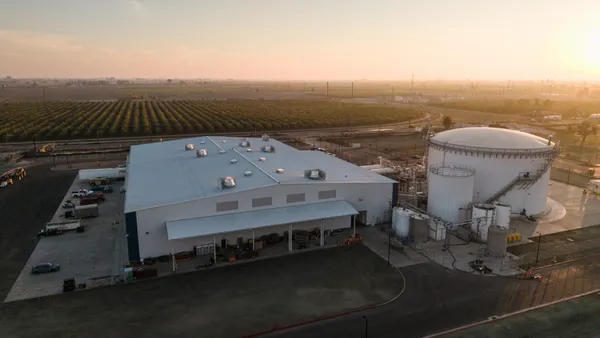UPDATE: May 2, 2022: Republic Services has closed on its $2.2 billion acquisition of US Ecology, with no required divestitures, according to a recent financial filing from the latter company. US Ecology also reported nearly $241 million in first-quarter revenue.
Discussion of a possible sale began as early as December 2020, according to a recent filing, with multiple interested parties discussing offers in the months ahead. US Ecology also had extended engagement with an activist stockholder who felt the company had overpaid for NRC Group in 2019 and suggested replacing senior leadership unless a sale was initiated. Republic Services formally expressed interest in October 2021, but US Ecology also continued fielding potential offers from other unidentified parties until an agreement was reached in February. Richard Burke, former CEO of Advanced Disposal Services and a US Ecology board member, led the transaction committee that helped navigate the process.
Dive Brief:
- February 9: Republic Services announced on Wednesday an agreement to acquire US Ecology, a major environmental solutions company, for $48 per share in cash. The deal, first reported by Bloomberg, is valued at $2.2 billion when factoring in approximately $700 million in net debt. The transaction could close by the end of the second quarter, pending regulatory approvals.
- Idaho-based US Ecology reported $968 million in revenue for the 12-month period through September 2021. Its North American portfolio comprises nine specialty waste landfills, including five hazardous waste landfills; 16 transfer, storage and disposal facilities; seven wastewater treatment facilities; and over 80 environmental services field locations, including treatment and recycling centers.
- "Today's announcement enables Republic Services to provide customers with one of the most complete set of product offerings across the environmental services space and creates significant value for our stakeholders," said Republic CEO Jon Vander Ark in a statement. "This strategic acquisition expands our geographic footprint across the U.S. and Canada and provides vertical integration capabilities for our environmental solutions business."
Dive Insight:
Arizona-based Republic has called out environmental services as a key focal point for its expansion via M&A, often saying during events and investor calls that its existing customers are increasingly interested in a service provider that can handle their full range of waste and recycling needs. Last year's acquisition of ACV Enviro was a notable step in that direction, but this new deal is larger in scale.
Republic's environmental solutions revenue was $51.4 million in the third quarter of 2021, more than double what it reported for that period in the prior year due to the acquisition of ACV and other companies. During an October earnings call, Vander Ark projected substantial growth opportunities for that line of business in the next few years and hinted at a pipeline of smaller and medium deals in the works. Republic now anticipates the combination of its business with US Ecology will lead to an estimated $1.4 billion in environmental solutions revenue.
In a November investor presentation, US Ecology shared a figure estimating the overall environmental services industry was worth at least $24 billion. The company described this sector as having "high barriers to entry for permitted waste facilities and specialized response capabilities" and a "high proportion of recurring revenue [that] provides resiliency through economic cycles." US Ecology is currently the industry's largest hazardous waste landfill operator by volume, followed by others such as Clean Harbors and WM.
US Ecology, marking its 70th anniversary this year, has grown substantially through its own series of acquisitions in recent years. Most notable was the estimated $966 million purchase of NRC Group in 2019, as well as the acquisitions of EQ in 2014 and Stablex in 2010.
The company provides treatment, disposal, beneficial reuse and recycling of hazardous, nonhazardous, radioactive and other specialty wastes. Other areas include a large field services division for issues such as emergency response and remediation, as well as a smaller division for the management of waste from oil and gas extraction (an area Republic entered into with the 2014 acquisition of Tervita). While each part of the business can be affected by large event-based revenue, US Ecology reports the vast majority of its revenue base for each segment is recurring.
"The combination of our companies provides a platform to accelerate our common strategy of providing a full complement of environmental solutions to better our world," said US Ecology CEO Jeff Feeler in a statement. "In addition, this transaction showcases the value of US Ecology's business, providing our stockholders with attractive and certain value, and brings together a network of assets with extensive environmental solutions expertise to handle customers' most challenging and complex needs."
Among multiple areas for potential overlap, US Ecology has been ramping up its focus on environmental, social and governance (ESG) issues and previously called out fleet electrification as a priority. Unlike Republic and other solid waste companies, US Ecology's landfills are not major sources of methane and the largest element of its greenhouse gas footprint is on the fleet side. Republic has been particularly bullish on fleet electrification in recent years. US Ecology has also called out management of PFAS — a group of per- and polyfluoroalkyl chemicals coming under increased scrutiny at the federal level and within the waste industry — as an upcoming market opportunity.
Republic estimates the deal will generate at least $40 million in "cost synergies" within three years of the acquisition, with the combined company potentially seeing an adjusted free cash flow conversion rate of at least 47% by 2024.
Hamzah Mazari, a managing director at investment firm Jefferies, said via email the synergy estimate "doesn’t include any revenue opportunities (like cross-selling)" so it's reasonable to "expect upside from that." He said the "enterprise value premium is in line with average industrial deals." Mazari also noted in a recent report that Vander Ark, who took over as CEO last June, is expected to "be more aggressive on M&A," with the company previously calling out the possibility to spend upward of $1 billion on deals in 2021.
In a Wednesday analysis report by Managing Director Michael E. Hoffman and others, investment firm Stifel similarly described the deal as a logical move. The report said Feeler "suggested then he would expect someday a solid waste company would own [US Ecology]" during the firm's 2019 Investor Summit and he reiterated the same at last year's event.
Stifel described the company as having five of the "best positioned hazardous waste landfills in North America" and is expected to have minimal overlap with Republic from an antitrust standpoint. Required divestitures are expected to be minimal, outside of potentially the energy waste operations in Texas, and "customer concentration is not a risk and in most cases the customer is seeking one consolidated waste management provider." Stifel did point out that Republic might voluntarily choose to divest international operations in as many as five other countries, as well as standby oil response operations in the U.S.
Stifel also said it anticipates the broader industrial waste sector "could see an accelerated phase of consolidation." Recent years have already seen some larger environmental solutions deals — such as Harsco buying Stericycle's environmental solutions business, Clean Harbors buying HydroChemPSC and GFL Environmental buying assets from Terrapure Environmental — but more opportunities are likely available.
Effram Kaplan, a managing director at investment bank and financial advisory firm Brown Gibbons Lang & Co., has previously described the sector as relatively unconsolidated. Last month, he said solid waste companies can be attracted to these types of deals because environmental solutions companies tend to trade at lower multiples, have good growth potential and may face less regulatory scrutiny from an antitrust standpoint.
While it used to be more common for solid waste companies to have large hazardous waste divisions, that trend shifted in recent decades. Today, Republic's other large publicly traded competitors all have some engagement in various aspects of environmental solutions, but none are currently talking about it as a major expansion opportunity to the same degree.
This story has been updated with additional analysis from Stifel















